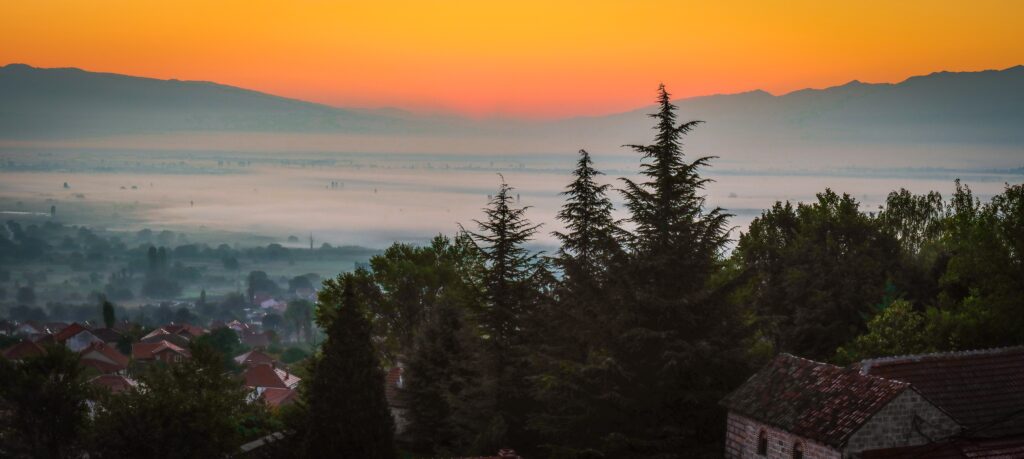The Prodigal Son – Metropolitan of Strumica Nahum
Refer to: Luke 15, 11-32
In the younger son, from the Gospel reading we notice the freedom and the awareness with which he addresses his Heavenly Father and that he seeks something that he feels naturally belongs to him, but also we notice that he obviously does not understand the very nature of the “livelihood (property, inheritance)” whose division he requires. “The portion of the livelihood” is the fullness of God’s grace, which we all receive in our hearts on the day of the Holy Baptism. It is from us alone and from our free will which determines, how we would behave towards this grace.
From His perspective, God’s only concern is not to disturb our freedom, and thus our mutual relationship: Parent – child. We have nothing more important than this relationship! This relationship is the only hope for our salvation!
The demon does not incite us to do evil and sin all at once, but gradually (incrementally), he first urges the younger son to seek and appropriate a “part” of that which is indivisible and which cannot be appropriated only to himself, and then, on the basis of the established and accepted thought that “he has something “, he deceives him to decide on independent and self-sufficient (complacent) life.
This is the path followed by all those who abuse the knowledge gained by seeing the “first light of the mind,” for the judgment of others and who, thinking that they have attained enlightenment of the mind, consequently, decide to self-guide in their spiritual life, and even worse, to lead others.
The “distant land” is the “place” of failure to fulfil God’s will, manifesting itself as a disobedience to the spiritual father and premature spiritual self-guidance, which is why God’s grace gradually moves away from us.
Disobedience brings with it the scattering and darkening of the mind.
The dispersion of the mind through the senses, the care for the earthly things, the fantasies, the demonic suggestions (in the form of thoughts and paranoia) – according to the Holy Fathers, this is the true fornication of our soul and the basis for any further fornication.
And naturally, anyone who lives as a fornicator is consuming his “part of the property (inheritance or livelihood)”, i.e. completely loses the divine grace and remains poor and hungry, outside the communion with God.
But the person who feels spiritual hunger and emptiness, mistakenly believes that the true food for him is the satisfaction of his passions, in fact, he becomes a feeder of pigs (breeder of passions) and a captive of the demon. He does not know that by satisfying the passions opens only a new and greater appetite and creates a feeling of greater hunger. The need for the constant and increasing satisfaction of the passions leads to illness and death of man; first of the soul, and then of the body.
 But what is it that can save man in those moments? The experience of the previously established relationship with the Heavenly Father, as well as human freedom, which, according to the Holy Fathers, the demon can never completely disable.
But what is it that can save man in those moments? The experience of the previously established relationship with the Heavenly Father, as well as human freedom, which, according to the Holy Fathers, the demon can never completely disable.
It is precisely this relationship, Parent-child, that the prodigal son remembers in those moments of contemplation (with no way out), and it is this relationship which is most important, which is always completely unspoiled by the Father, that saves him.
How do we know this? From the very realisation of the fact that this very relationship is disturbed and that he himself is guilty of this disturbance: “Father, I have sinned against heaven and before You, and I am no longer worthy to be called your son!” (Luke 15, 18-19)
Our part calls for us to have good intentions, to use the gift of freedom for building communion with God and to strive (endeavour) in that direction, and everything else is a work of God’s grace, which works for (with) us. Without God and without God’s grace we can do nothing! The words from this gospel reading mean just that: “And when he was still a great way off, his father saw him, and had compassion on him, and ran, embraced him, and kissed him” (Luke 15:20).
“And the son said to him, Father, I have sinned against heaven, and in Your sight, and am no longer worthy to be called Your son” (Luke 15:21). The younger son did not finish the previously imagined request: “But accept me as one of your hired servants!” Why? Because it is pointless to say that, looking at the unfailing parenting behaviour of his Father, which determines and dignifies him with the title “son”.
The Father behaves in such a manner as if the disloyalty and the breakdown of the relationship by his son had not occurred, and, in the reunion with him he behaves as a true Father would towards his son.
And how does the Father furthermore behave?
“And the father said to his servants, ‘Bring out the best robe, and put it on him, and put a ring on his hand, and sandals on his feet; And bring the fatted calf here and kill it: let us eat and be merry, for this my son was dead and is alive again; he was lost and is found.’ And they began to rejoice.” (Luke 15: 22-24).
In the prodigal son occurs: renewal of the grace, confirmation of the relationship and enlightenment of the mind, gaining strength and awareness for a greater struggle (endeavour) that leads to perfection, participation in the Holy Eucharist and communion with the Holy Mysteries of the Body and Blood of Christ. God, as St. Gregory Palamas says, “endows those who live in true repentance with such gifts that causes envy to those who spiritually strive (endeavour) in erroneous ways.
Yes, that would have happened to us if we had repentance, but it seems we do not have enough. I certainly do not have.
Most-Holy Theotokos, save us!
Metropolitan of Strumica, Nahum
(28.02.2021 17:08)
Photo by: Fr. Gavril Galev

